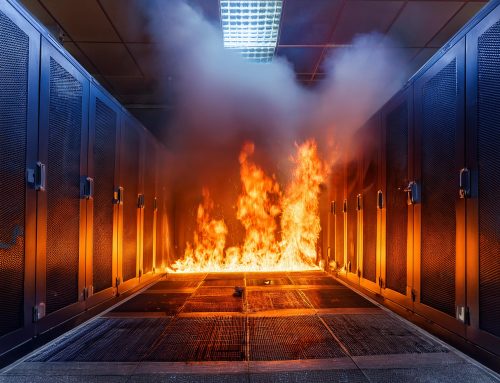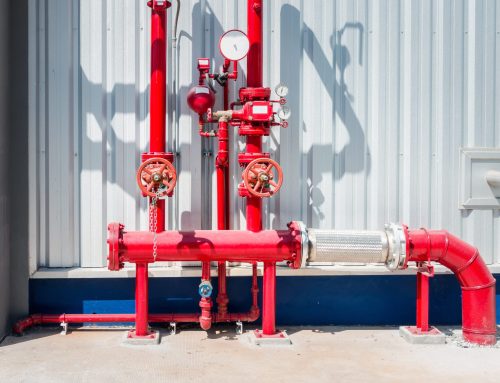Hot temperatures and heat from other heat sources exposes sprinklers to excessive heat weaken a sprinkler system overtime. The result? A weakened sprinkler might not become inoperable right away, but it could go off unexpectedly at some point in the future, even if there’s no fire.
In this article, we explore how high temperatures can impact the operation of commercial fire sprinkler systems and what measures can be taken to ensure their reliability during hot weather conditions.
How Can Hot Weather Affect Fire Sprinkler Systems?
Hot weather can have surprising effects on the reliability and performance of fire sprinkler systems. Understanding these impacts is crucial for maintaining their effectiveness and ensuring the safety of your property.
- Thermal expansion and contraction
- Pipes and fittings: Extreme heat can cause the metal pipes and fittings in a fire sprinkler system to expand. This thermal expansion can put stress on the joints and connections, potentially leading to leaks or even pipe bursts. Conversely, when temperatures drop, the metal contracts, which can also cause stress and damage.
- Sprinkler heads: The metal components of sprinkler heads can also be affected by thermal expansion. If the temperature gets too high, it can affect the sensitivity and functionality of the sprinkler heads, potentially causing them to activate prematurely or fail to activate when needed.
- Water supply issues
- Evaporation: In extremely hot conditions, the water in the pipes may evaporate more quickly, especially in systems that are not frequently used. This can lead to a decrease in water pressure, affecting the system’s ability to deliver an adequate supply of water during a fire.
- Heat damage: High temperatures can affect the water storage tanks and supply lines. If the water supply is compromised, it can hinder the system’s effectiveness in controlling or extinguishing a fire.
- System Components
- Heat-sensitive elements: Fire sprinkler systems often include heat-sensitive elements that are designed to trigger the system at specific temperatures. Prolonged exposure to high ambient temperatures can affect the calibration of these elements, making them less reliable.
- Control valves and alarms: The electronic components of control valves and alarm systems can also be vulnerable to heat. Excessive temperatures can cause electrical components to malfunction, leading to false alarms or, worse, a failure to activate during a fire.
Preventive Measures for Hot Weather
To ensure that your commercial fire sprinkler system remains operational during hot weather, it’s important to take preventive measures and perform regular maintenance. Here are some tips to help protect your system from the effects of high temperatures:
Regular Inspections and Maintenance
Regularly scheduled inspections are essential for identifying and addressing any potential issues caused by thermal expansion or contraction. Make sure a qualified technician examines the system thoroughly, checking for leaks, corrosion, and other signs of damage. Conduct pressure tests to ensure the system maintains adequate water pressure even during high-temperature conditions. This can help identify any weaknesses in the system that might be exacerbated by heat.
Temperature Control
Insulate exposed pipes and other components to protect them from extreme temperatures which can help reduce the impact of thermal expansion and contraction. Maintain a stable indoor temperature in areas where critical components of the fire sprinkler system are located. This can be achieved through proper ventilation, air conditioning, and other climate control measures.
System Upgrades
Consider upgrading to heat-resistant materials for pipes, fittings, and sprinkler heads. These materials are designed to withstand higher temperatures and are less likely to suffer from thermal expansion and contraction. Implement advanced monitoring systems that can detect and alert you to temperature fluctuations and potential issues in real time to allow for prompt action to mitigate any risks.
Emergency Preparedness
Develop and implement contingency plans for extreme weather conditions. Make sure all employees are aware of the procedures and know what to do in case of a fire emergency during hot weather. Consider installing backup systems or secondary water supplies to ensure that the fire sprinkler system can operate effectively even if the primary water supply is compromised.
Fire Systems. Inc.
Hot weather can indeed affect the operation of commercial fire sprinkler systems, but with proper maintenance, regular inspections, and preventive measures, the impact can be minimized. By understanding the potential risks and taking proactive steps to address them, business owners can ensure that their fire sprinkler systems remain reliable and effective, even in extreme temperatures. Remember, the safety of your business, employees, and customers depends on the continuous, proper functioning of your fire sprinkler system, regardless of the weather conditions.
Let Fire Systems, Inc. keep your buildings’ fire sprinkler system safe, secure, and operable through these hot Georgia summers. We can design, install, inspect, maintain, and repair all types of fire sprinkler systems. Contact us today at 770-333-7979 or visit our website for more information on all of our offerings. We look forward to speaking with you.
Sites Consulted
https://www.ifsaglobal.org/2016-6-30-ifsa-alert-avoid-overheating-fire-sprinklers/






